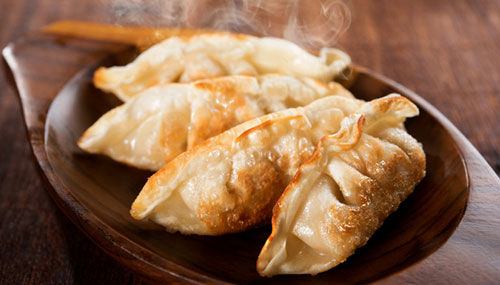U.S.-Asia Business
Chinese Dumplings, Made in the USA
By Melody Yuan

How a household Chinese frozen food company invested in US manufacturing.
How many frozen food items do you have in your refrigerator today? Conveniently packaged ready-to-eat foods have become essential household items for the modern citizen, and every grocery store has aisles dedicated to frozen foods. Whether it’s mozzarella sticks or waffles, the frozen food business is big. According to the Frozen Food Market: Global Industry Analysis, Trends, Market Size and Forecasts report, the global frozen food market is set to grow with a compound annual growth rate of 5.2 percent from 2017 to 2023. Areas in the world with the highest demands for these products include North America, Europe and the Asia-Pacific, and with the expected rise in global demand, more companies are looking to expand their market base.
“I almost always eat out, or I’ll just microwave something quickly in my apartment,” says recent college graduate Luke Phillips. “When I used to live in a dorm, I didn’t have access to a stove every day, so I lived off of packaged meals,” he says. Generating more than $53 billion in sales in the U.S. in 2016, the frozen food industry, which continuously strives to improve its taste and quality to compete with healthier food options, is seeing growth in shopping traffic. While frozen chicken and pizza remain the most popular items for American consumers, retailers from around the world are looking at expanding their market by entering the U.S. One of these frozen food companies is Synear Food Holdings Ltd.
Headquartered in Zhengzhou, Henan province, Synear is one of the largest and most well-known frozen food brands in China. Famous for their various types of frozen dumplings, Synear began its business in 1997 and has since grown to dominate 30 percent of China’s frozen food market. Producing and manufacturing a wide array of frozen food products, from savory and sweet dumplings, to specialty desserts and snacks, the company has become the leading maker of ready-to-eat frozen foods. Despite capturing a substantial size of the domestic market and selling to large supermarkets and fast food chains like KFC, Synear wanted to expand more in the international arena.
“We’re really looking to penetrate not just the U.S. market, but also the global market,” says Wu Bing, general manager of Synear Foods USA. “Our goal for 2019 is to really expand our product line and maximize our reach to customers around the world.”

Using products locally grown and produced in the U.S. for their frozen foods would mean a higher chance of getting their product line out to more supermarkets and restaurant chains.
“The regulations set on Chinese food makers to sell overseas are pretty strict,” says Annie Ye, first vice president and China business banking manager at East West Bank. “Synear was only allowed to export meat-free frozen products to the U.S. and other locations, including Canada, Europe and Australia.” Given the limitations to exporting their product lines, Synear had to find a different and more cost-effective way to get over the regulatory hurdles. The opportunity came in 2015, when Nestle USA decided to sell its Hot Pockets factory in Chatsworth, California. The 189,170-square-foot plant had been shut down, since Hot Pockets consolidated its production in Kentucky, and the location was prime for Synear to acquire and begin production of their frozen foods in the United States.
Why move production to the U.S.?
While there are already a handful of frozen Asian cuisines readily available, Synear’s decision to open a manufacturing facility in California, which has the largest Asian population in the U.S., is an indication that the company is looking at a long-term game plan and end-result.
“Using products locally grown and produced in the U.S. for their frozen foods would mean a higher chance of getting their product line out to more supermarkets and restaurant chains,” says Jim Foo Loo, cofounder and former CEO of Big L Enterprises, a food service distributor on the East Coast. “All of our customers demand the best quality food that has FDA approval and is locally sourced,” he says.
With U.S.-grade meats and vegetables now in their frozen foods, not only are they able to expand their product line in the U.S., they’re also able export to Canada, Europe and Australia. “It’s a strategic move on our part to expand into international markets,” says Bing. “And with the rising popularity for Chinese food, we’re looking to sell at whole-sale stores like Costco and also serve restaurants and fast food chains like Panda Express.” Through a commercial loan with East West Bank, Synear Foods USA was able to finance its working capital needs to purchase vital equipment for their production line, as well as make improvements to the warehouse. Full production began in the summer of 2017.
Now, the former Hot Pockets facility today is back up and running, which has helped to create jobs and employ local Californians to maintain the production line. While the facility currently only creates pot stickers, shumai, spring rolls, wontons and dumplings, Synear Foods USA plans to expand their product line offerings. The company is also committed to establishing a U.S.-based research and development team to improve their existing frozen foods, packaging and distribution of products.
The future of frozen
“Frozen foods will definitely stay relevant for many years to come,” says Loo, “and I bet frozen Chinese cuisine will be among those trendy foods that will catch on in American households.” Loo compares the potential of frozen Chinese cuisine to the Japanese mochi ice cream craze that caught on and continues to generate strong sales from consumers and restaurants.
With rising urbanization driving demand for convenient foods, the industry is looking at a robust growth rate for years to come. Key frozen food vendors that already have a stronghold in the North American market, like Ajinomoto Windsor, Kraft Heinz, Tyson Foods and Nomad Foods, will continue to develop new frozen products, flavors and options for consumers. Synear, having just entered international markets, will have to make strategic partnerships, distribution plans and marketing decisions to ensure that they have the most effective reach to help their products catch on in the marketplace.

